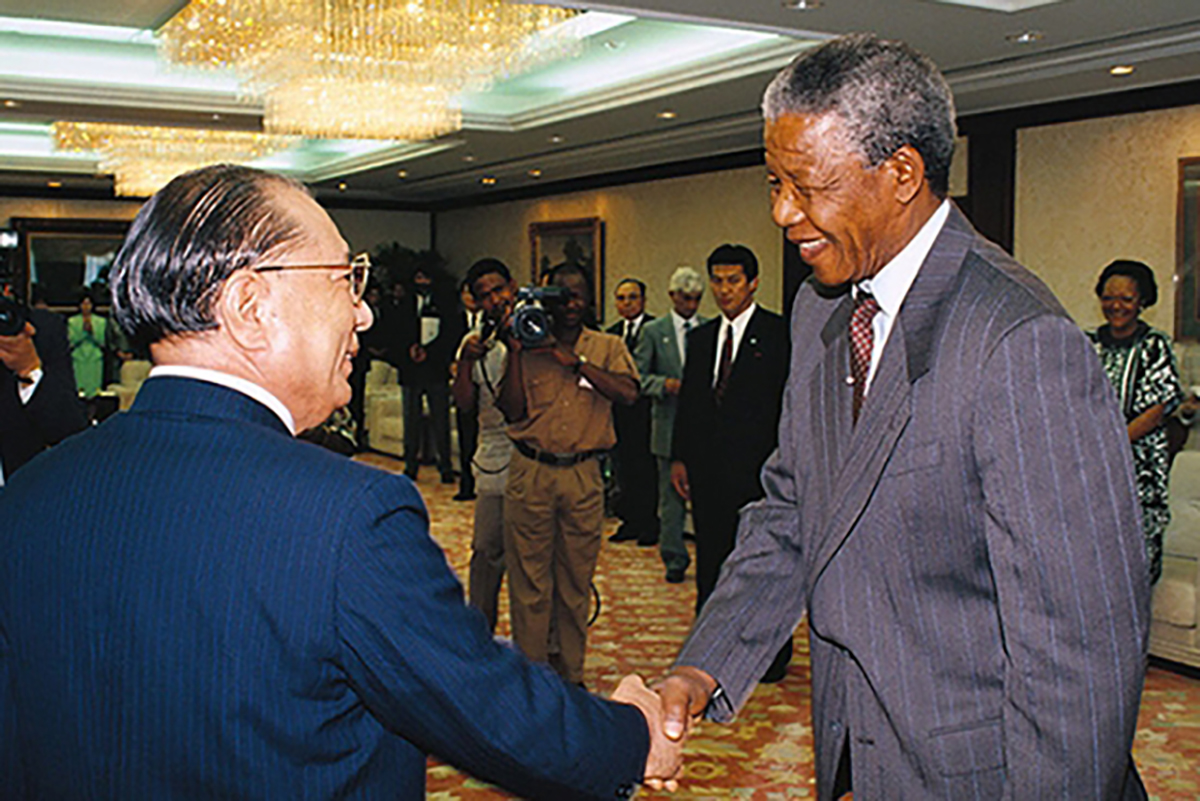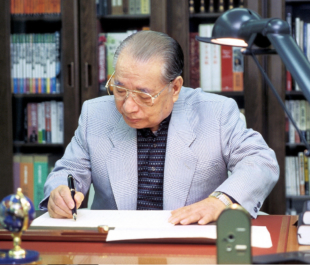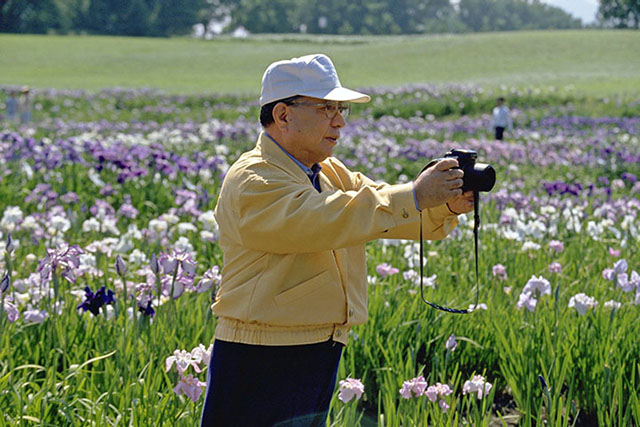Supplementary Resources for Leaders Sharing the Discussion Meeting Gosho
_[Slide 1]_
The Record of the Orally Transmitted Teachings
_[Slide 2]_
(A) Background
The Record of the Orally Transmitted Teachings (OTT, also known as Ongi kuden) is a compilation of lectures that Nichiren Daishonin gave on important selected passages of the Lotus Sutra while residing on Mount Minobu. Containing the essence of the Daishonin's teachings, it was transcribed and compiled by the Daishonin's close disciple and successor, Nikko, and with the Daishonin's permission, handed down to posterity.
_[Slide 3]_
Compiled in two volumes, Part 1 of The Record of the Orally Transmitted Teachings begins with a discussion of the term Nam-myoho-renge-kyo and is followed by comments on key passages from the "Introduction" (1st) Chapter, then proceeding through each chapter to the "Emerging from the Earth" (15th) Chapter of the Lotus Sutra.
Part 2 begins with comments on key passages from the "Life Span" (16th) Chapter to the "Encouragement of the Bodhisattva Universal Worthy" (28th) Chapter of the Lotus Sutra, followed by comments on the Immeasurable Meanings Sutra and the Universal Worthy Sutra, which are known as the Opening and Closing sutras of the Lotus Sutra respectively.
When explaining the meaning of each of the key passages of the Lotus Sutra, the Daishonin first cites as references, the major works of T'ien-t'ai and Miao-lo. This will then be followed by a statement, "The Record of the Orally Transmitted Teachings says*, afterwhich the Daishonin interprets the same passage from the standpoint of the teachings of Nam-myoho-renge-kyo.
In his lectures, the Daishonin gives his explication of the key passages in the Lotus Sutra and its Opening and Closing Sutras from the standpoint of the Daishonin's Buddhism to clarify the wonderful power of Nam-myoho-renge-kyo, the fundamental Law of the universe, and the immeasurable benefits one can accrue by practising this teaching.
_[Slide 4]_
The portion that we are studying this month is from the section titled "Point Two, on the persons who 'have fulfilled their great vow, ... because they pity living beings, they are born in this evil world so they may broadly expound this sutra'" under "Chapter Ten: The Teacher of the Law, Sixteen important points".
(So let's read the passage proper together)
_[Slide 5]_
The Record of the Orally Transmitted Teachings says: The “great vow” refers to the propagation of the Lotus Sutra. “Because they pity living beings” refers to all the living beings in the country of Japan. The persons who “are born in this evil world” are Nichiren and his followers. “Broadly” means to expound the sutra throughout the southern continent of Jambudvipa. “This sutra” refers to the daimoku. Now the above passage refers to Nichiren and his followers, who chant the daimoku, Nam-myoho-renge-kyo.
(The Record of the Orally Transmitted Teachings, p. 82)
_[Slide 6]_
(B) Key Points for Sharing
Key Learning Points of the Gosho Passage:
1. The Mission of Bodhisattvas of the Earth Is to Impart Hope and Courage to the People
2. Nichiren Buddhism Enables Us to Change Karma into Mission
3. Our Struggle for Kosen-rufu Helps Us Achieve Our Human Revolution
_[Slide 7]_
1. The Mission of Bodhisattvas of the Earth Is to Impart Hope and Courage to the People
_[Slide 8]_
This passage from The Record of the Orally Transmitted Teaching is the portion where Nichiren Daishonin explains on the following passage from “The Teacher of the Law” (10th) Chapter of the Lotus Sutra: “… you should understand that these people …. have fulfilled their great vow, and because they take pity on living beings they are born in this evil world so they may broadly expound this sutra.” (The Lotus Sutra and Its Opening and Closing Sutras, p 200)
In this way, “The Teacher of the Law” Chapter expounds that those who propagate the teachings of the Lotus Sutra in the Latter Day of the Law are all originally magnificent Bodhisattvas who have voluntarily chosen to be born in this evil age to lead the suffering people to happiness.
Ikeda Sensei explains this point in his guidance in this manner:
_[Slide 9]_
In The Record of the Orally Transmitted Teachings, Nichiren Daishonin states: “The ‘great vow’ refers to the propagation of the Lotus Sutra”. (OTT, p 82)
The great vow of kosen-rufu is the pledge that fills the hearts of the Daishonin’s followers.
Propagating the Lotus Sutra, the teaching of universal enlightenment—in other words, spreading the quintessential Law of Nam-myoho-renge-kyo—means widely and deeply instilling the philosophy of respect for human dignity and the sanctity of life in society.
_[Slide 10]_
It means reaching out to those who are suffering, and kindling a flame of hope and courage in their hearts to go on living and overcome all adversity.
It means upholding the ideal of realizing a peaceful and prosperous society based on the humanistic principles of Buddhism, and laying an indestructible foundation for world peace.
Advancing kosen-rufu is unquestionably the key to transforming the destiny of all humanity.
(From President Ikeda’s Essay Series, “Our Brilliant Path to Victory”)
If we are true Bodhisattvas of the Earth striving to attain Buddhahood in this lifetime to secure a life of genuine happiness, then we must take actions and strive for the realization of kosen-rufu.
The Daishonin states in this Gosho passage: “The persons who “are born in this evil world” are Nichiren and his followers.”
In our world today, it is we, the members of the Soka Gakkai who are actually reaching out to those who are suffering and kindling a flame of hope and courage in their hearts to go on living and overcome all adversity in reality.
_[Slide 11]_
2. Nichiren Buddhism Enables Us to Change Karma into Mission
Despite confronting adversities oneself, he or she continues to reach out to others who are also challenging difficulties, empathize with them, pray with them and overcome the challenges together with them – this is the way of life of a genuine bodhisattva.
_[Slide 12]_
In “The Teacher of the Law” Chapter of the Lotus Sutra, it is expounded that “These people voluntarily relinquish the reward due them for their pure deeds and, in the time after I have passed into extinction, because they pity living beings, they are born in this evil world so they may broadly expound this sutra. (The Lotus Sutra and Its Opening and Closing Sutras, p 200)
In Buddhism, this is termed the principle of “voluntarily assuming the appropriate karma”.
In other words, by transforming our karma through the practice of faith, we are proving the greatness and validity of Nichiren Buddhism.
On top of this, through our own actual proof of overcoming adversities, we are able to ignite the light of hope in the hearts of those who are confronting painful hardships by convincing them that they, too, can definitely enjoy happiness in life, just as we do.
Ikeda Sensei taught us that such a way of life is one in which we transform our karma into mission.
In this way, Soka Gakkai members who are spreading the teachings of the Mystic Law are great Bodhisattvas who are fulfilling their mission for kosen-rufu. As such, there is no way that they cannot overcome their difficulties in life as these struggles are meant to lead others to happiness.
Ikeda Sensei explains this point in this manner:
_[Slide 13]_
To simply view your sufferings as "karma" is backward-looking. We should have the attitude: "These are sufferings I took on for the sake of my mission. I vowed to overcome these problems through faith."
When we understand this principle of "voluntarily assuming the appropriate karma," our frame of mind is transformed; what we had previously viewed as destiny, we come to see as mission. There is absolutely no way we cannot overcome sufferings that are the result of a vow that we ourselves made.
(From President Ikeda’s discussions on “The Wisdom of the Lotus Sutra”)
Just as Sensei teaches us in this guidance, let us reach out to the person who is experiencing great challenges in life right in front of us, impart warm encouragement by sharing our own experiences of faith with powerful conviction.
_[Slide 14]_
3. Our Struggle for Kosen-rufu Helps Us Achieve Our Human Revolution
_[Slide 15]_
The greatest wish of the Buddha is the happiness of all living beings. And this is the very purpose of Buddhism.
For this reason, Nichiren Daishonin says here in this Gosho passage that “The “great vow” refers to the propagation of the Lotus Sutra”, teaching us that our great vow is to propagate the teachings of the Mystic Law.
During the Daishonin’s time, the people were living in fear and insecurity amidst great social turmoil whereby natural disaster, epidemic and famine were rampant.
It was a time where people could only think about themselves. But the Daishonin taught that one should not only work for one’s own happiness, one should also strive to contribute to the happiness of others.
Why did he do so? This is because by sharing the same vow as the Buddha, the Buddha’s wisdom and courage will well forth from the depths of one’s life, thereby elevating and forging one’s state of life.
The Daishonin concludes this Gosho passage by stating: “‘This sutra’ refers to the daimoku. Now the above passage refers to Nichiren and his followers, who chant the daimoku, Nam-myoho-renge-kyo.”
In the context of our contemporary world today, it is the members of the Soka Gakkai who are exerting themselves in the practice of chanting the daimoku of Nam-myoho-renge-kyo and striving to realize the happiness for oneself and others throughout the world based on the great vow to lead all people to happiness in exact accord with the spirit of Nichiren Daishonin.
_[Slide 17]_




